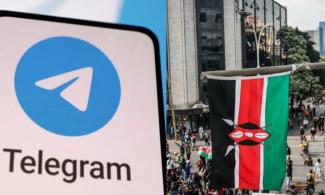Kenya has begun blocking access to Telegram as anti-government protests flare across the country, prompting concerns of digital censorship and broader suppression of free expression.
According to NetBlocks, a global Internet watchdog, the messaging app has become inaccessible on multiple networks, either partially or entirely, since Tuesday.
The crackdown coincides with the anniversary of the June 25 protests, now symbolic of growing public frustration over economic hardship, poor governance, and unfulfilled government promises.
In a further escalation, the Communications Authority of Kenya ordered all TV and radio stations to halt live coverage of the protests, citing public safety and alleged constitutional breaches.
Critics, however, argue that the move is less about safety and more about silencing dissent.
As traditional media is muzzled, Kenyans are increasingly turning to VPNs and encrypted messaging apps to stay connected and share updates.
Civil society organisations and digital rights advocates have condemned the restrictions, warning that such measures erode public trust and violate citizens’ rights to free speech and peaceful assembly.
“These are not just digital disruptions,” said one advocate. “They are attacks on democracy and public accountability.”
The protests, driven by rising costs of living and a perceived failure of leadership, show no sign of slowing. As tension rises and more platforms risk being targeted, groups like NetBlocks are on high alert, calling for transparency and restraint.
Rights organisations are urging Kenyan authorities to restore access to digital platforms, uphold media freedom, and protect the right of citizens to protest and be informed.







